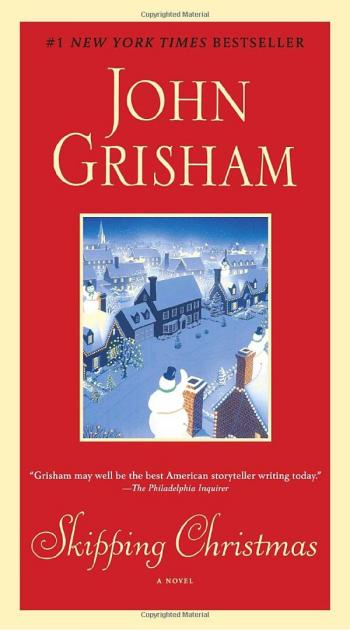
scrounge: /skrounj/ informal verb: to actively seek [books] from any available source

Book Scrounger's note: The following is a guest review by Doug, a.k.a. Professor Puzzler.
There are many people whose only knowledge of the book Skipping Christmas by John Grisham is, "Oh, that's the book that the movie Christmas with the Kranks is based on." If that's your only knowledge of the book, you're really missing out on something.
Even though the movie covers most of the major plot points of the book, it manages to get the book utterly wrong in many ways. So if you weren't a fan of Christmas with the Kranks, give the book a chance. The rest of this review is primarily a comparison of the movie and the book.
Skipping Christmas is the story of Luther and Nora Krank, who decide to skip Christmas (their daughter has moved to Peru, and for the first time in 23 years, they're facing the holiday season without her) and take a holiday cruise instead. Their neighbors and friends are appalled by this decision, and make it very difficult for them to avoid the madness of Christmas preparation. The difficulties they face include: boy scouts who want to sell them a Christmas tree, Reverend Zabriskie worrying about their spiritual condition, and neighbors who are angry with them for having the only house on the street without a giant Frosty on their roof .
It's also the story of two parents who love and miss their daughter. Love and miss her enough that they would do pretty much anything for her.
So how do the book and movie differ? What did the movie get wrong?
- Luther Krank, in the movie, is a cheap version of Ebenezer Scrooge. He's the miserable, unlikeable villain who hates Christmas, doesn't particularly care about his family, and wants to ruin Christmas for boy scouts, orphans, and homeless people. In the book, he is none of these things. He's simply a man who wants to take a break from the insanity of our culture's celebration of Christmas. When the boy scouts want him to buy a tree, he firmly refuses, but in the book, the softer side of his nature compels him to tell them, "Come back in the spring, and I'll give you $100 toward Jamboree." Because the movie version of Luther is portrayed as a Scrooge, the movie has to have everyone awkwardly beat him over the head with his meanness in order to get him to change his ways. In the book, his final actions flow much more naturally, because he actually isn't a villain.
- The movie ignores subtlety and satire, and goes straight for slapstick. When you read the book, you can think to yourself, "I know these people -- they remind me a lot of people I know." They are a little over-the-top, but not so much that they aren't believable. The movie, on the other hand, repeatedly crosses the line into absurdity. Luther sprays his sidewalk with a hose, making an ice patch for carolers to slip on (and in the process freezes the neighbors' cat into a statue). Vic Frohmeyer runs down the street with his hands stuck in Nora's car window, screaming, "Stop the car, Nora! Stop the car!" A race to the last "hickory honey ham" in the supermarket turns into a cringe-worthy disaster that ends with the ham being flattened in the street by an eighteen-wheeler.
- The book knew when to stop. In the book, the first 199 pages lead up to the moment when the neighbors find out about the jam that the Kranks are in. From there, it only takes 28 more pages to wrap up the story -- 28 pages is all that's necessary to move from the problem to a very satisfying solution. The movie, however, shoehorns in a power failure, a burglary, and other very forgettable moments (which annoyed me, but, since they were forgettable, I've already forgotten them -- even though I just re-watched the movie last night). There was no need to to drag out the ending; the joy of the final moments were damaged, rather than enhanced, by the foolishness. And, speaking of damaging the ending, the movie actually added extra slapstick after the heart-warming conclusion; I'm really not sure what the movie-makers thought that would accomplish.
- When Publishers Weekly reviewed Skipping Christmas, they claimed that all good Christmas stories have to rely on an element of fantasy because Christmas is a time of miracles. Thus, they reasoned, Skipping Christmas isn't a good Christmas story, because it is so mundane. I disagree with this, but even so, one could argue that there's room for a supernatural element -- the reader is free to interpret the mysterious stranger Marty (who knows everyone, but is known by no one) in either a mundane or supernatural way. Perhaps he is symbolic of all the forgotten people at Christmas time. Or maybe he is a Christmas angel. Or Santa Claus. The movie, of course, clubs you over the head with the supernatural by showing Marty's volkswagen being pulled by a team of reindeer at the end of the movie.
If you didn't like Christmas with the Kranks, that doesn't mean you should skip Skipping Christmas. Give it a chance. And if you did like the movie, I'd still give the book a chance -- I think you'll find it to be a richer experience.
Format: Paperback
Author: John Grisham
Pages: 256
Content Advisory: A little bit of language, peril, etc. The movie is rated PG, and plotwise it follows the book.
Added note: Just for fun, I wrote a Kranky math problem for my high school math students, loosely based on this book: A Kranky Christmas.

